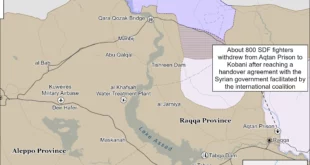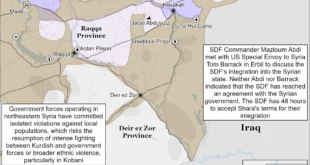 Iraqi Prime Minister Nouri Maliki condemned a US raid Saturday in Baghdad’s Shiite Sadr City slum — a politically sensitive district for him — in which American troops searching for Iranian-linked gunmen sparked a firefight that left 26 Iraqis dead.The US military said all those killed in the fighting were gunmen, some of them firing from behind civilian cars. But residents said eight civilians were killed in their homes and angrily accused American troops of firing wildly during the pre-dawn assault.
Iraqi Prime Minister Nouri Maliki condemned a US raid Saturday in Baghdad’s Shiite Sadr City slum — a politically sensitive district for him — in which American troops searching for Iranian-linked gunmen sparked a firefight that left 26 Iraqis dead.The US military said all those killed in the fighting were gunmen, some of them firing from behind civilian cars. But residents said eight civilians were killed in their homes and angrily accused American troops of firing wildly during the pre-dawn assault.
Sadr City is the Iraqi capital’s largest Shiite neighbourhood — home to some 2.5 million people — making US raids there potentially embarrassing for Maliki’s Shiite-led government. The district is also the stronghold of the Mehdi Army, loyal to anti-American cleric Muqtada Sadr, who was once Maliki’s ally. “The Iraqi government totally rejects US military operations … conducted without prior approval from the Iraqi military command,” Maliki said in a statement concerning the Sadr City raid. “Anyone who breaches the military command orders will face investigation.” Maliki last year banned military operations in Sadr City without his approval after complaints from his Shiite political allies. The ban frustrated US commanders pushing for a crackdown on the Mehdi Army, blamed for sectarian killings.
Maliki later agreed that no area of the capital was off-limits, after US President George W. Bush ordered reinforcements to Iraq as part of the Baghdad security operation.
Also Saturday, the military announced that two American soldiers were charged with the premeditated murder of three Iraqis and with planting weapons on the bodies to cover up the slayings, which took place between April and June near Iskandariyah, 50 kilometres south of Baghdad.
Staff Sgt. Michael A. Hensley from Candler, North Carolina, was jailed Thursday in Kuwait, facing three counts each of premeditated murder, obstructing justice and wrongfully placing the weapons. Spc. Jorge G. Sandoval, arrested at his home in Laredo, Texas, faces one count each of premeditated murder and planting a weapon, the military said.
In Muqdadiyah, 90 kilometres north of the capital, police said a suicide bomber blew himself up near a crowd of police recruits, killing at least 23 people and wounding 17. The US military also announced the death of a US soldier Friday, and the wounding of three others, when a sophisticated, armour-piercing bomb hit their combat patrol in southern Baghdad.
US troops have discovered a mass grave with as many as 40 bodies near Fallujah in western Iraq, the US military said Saturday. Between 35 and 40 bodies — with gunshot wounds and limbs bound — were discovered at site, the statement said. US military officials are investigating, it said, without elaborating, and it was unclear who the victims were.
The US military said it conducted two pre-dawn raids in Sadr City, killing 26 “terrorists” who attacked US troops with small arms fire, rocket-propelled grenades and roadside bombs. But Iraqi officials said all the dead were civilians.
An American military spokesman insisted all of those killed were combatants. “Everyone who got shot was shooting at US troops at the time,” said Lt. Col. Christopher Garver. “It was an intense firefight.” US troops detained 17 men suspected of helping Iranian terror networks fund operations in Iraq, a military statement said. There were no US casualties.
Witnesses said US forces rolled into their neighbourhood before dawn and opened fire without warning.
“At about 4:00am, a big American convoy with tanks came and began to open fire on houses — bombing them,” said Basheer Ahmed, who lives in Sadr City’s Habibiya district.
“What did we do? We didn’t even retaliate — there was no resistance.” According to Iraqi officials, the dead included three members of one family — a father, mother and son. Several women and children, along with two policemen, were among the wounded, they said.
Houses, a bakery and some other shops were damaged by US tank fire during the assault, Iraqi officials said. In the Shiite holy city of Najaf, Sheikh Salah Obaidi, a spokesman for Sadr condemned Saturday’s raids: “The bombing hurt only innocent civilians.” A policeman wounded in the raid, Montadhar Kareem, said he was on night duty in the Habibiya area when US troops moved in and “began bombing houses in the area”. “The bombing became more intense, and I was injured by shrapnel in both my legs and in my left shoulder,” Kareem said from a gurney at Al Sadr General Hospital.
Hours afterward, a funeral procession snaked through the streets of Sadr City’s Orfali district. Three coffins were hoisted atop cars.
One resident who goes by the nickname of Um Ahmed, or “mother of Ahmed”, stood outside her home as mourners passed by.
“We are being hit while we are peacefully sleeping in our houses. Is that fair?” she cried. The woman gave only her nickname, fearing reprisal.
The US military statement said American troops opened fire on four civilian cars during the assault — one that failed to stop at a checkpoint, and three others that insurgents were using for cover as they fired on US soldiers.
“Every structure and vehicle that the troops on the ground engaged were being used for hostile intent,” Garver said. Some of the 26 dead were in civilian cars, some had been hiding behind cars and others had fired on US troops from nearby buildings, he said.
 Eurasia Press & News
Eurasia Press & News


